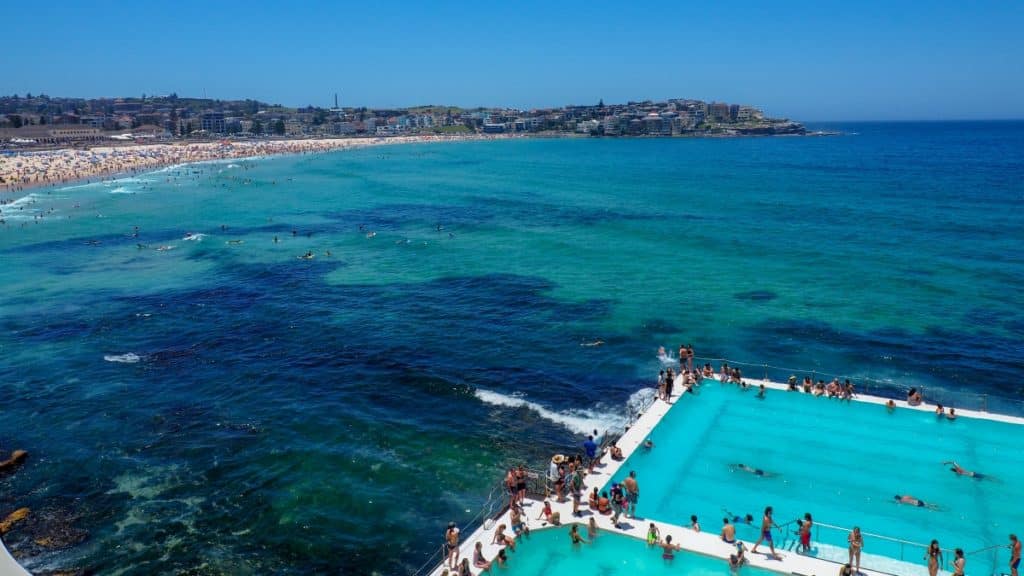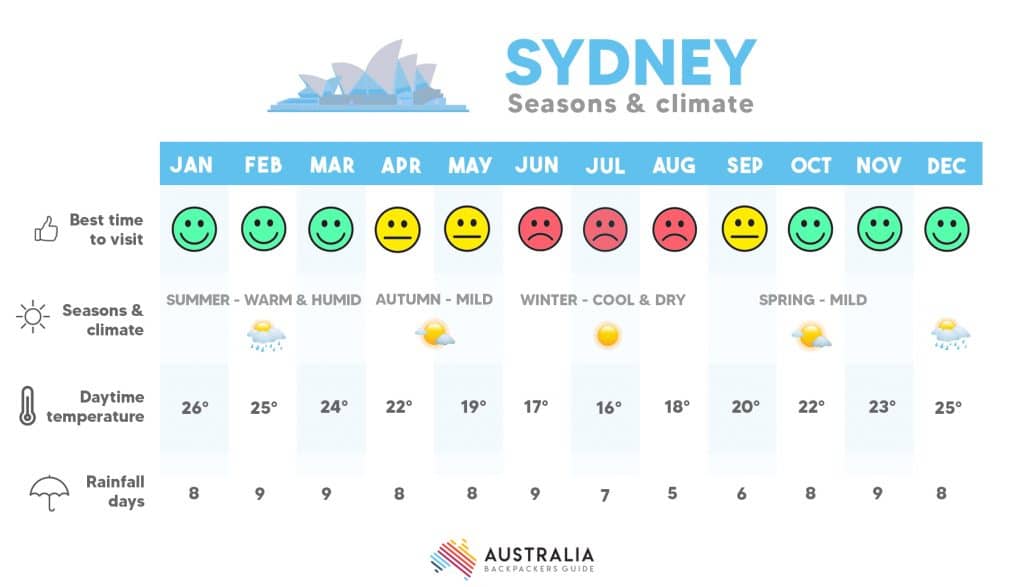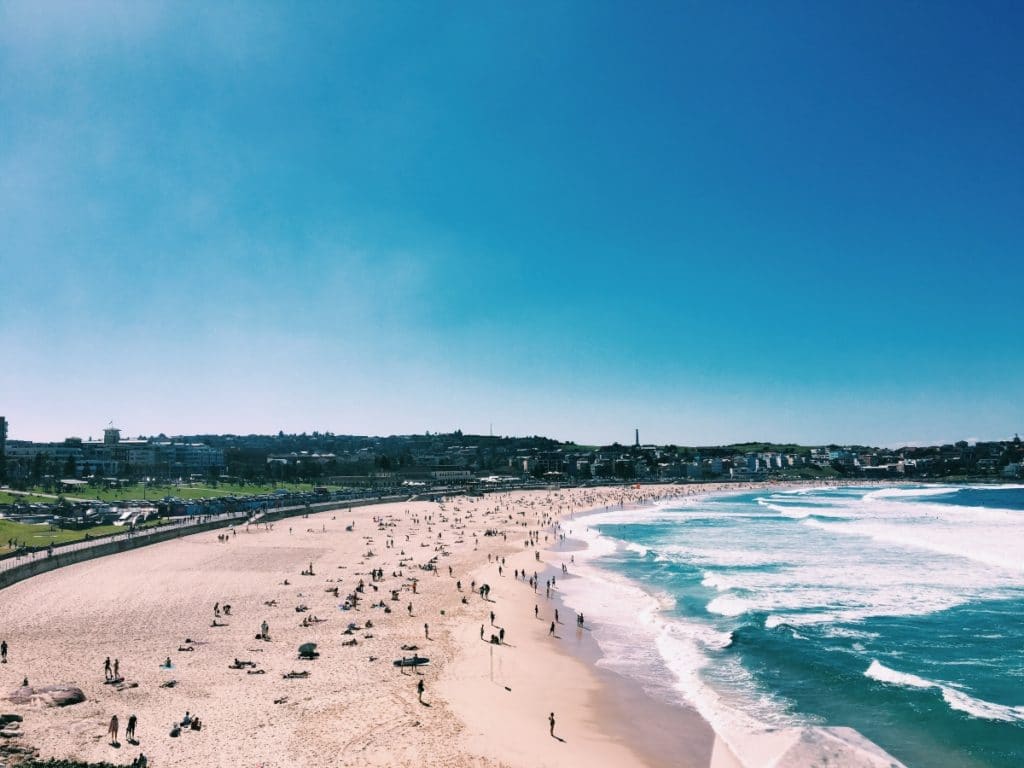
Due to the vastness of the country, the climate in Australia varies greatly from region to region. Sydney, the vibrant capital of New South Wales, enjoys a temperate climate with warm summers, cool winters, and a moderate amount of rainfall spread throughout the year. This makes Sydney a fantastic destination to visit at any time, with each season offering its unique charm and array of activities. Here’s a detailed look at the climate and seasons in Sydney, helping you plan your visit to this iconic Australian city.
Table of Contents
The climate in Sydney
Due to Sydney’s geographical location in the southeastern part of the country, the city enjoys a mild climate throughout the year. Unlike the North of the country with two seasons, the dry season and the rainy season, Sydney has four seasons. The seasons are, however, reversed compared to those in Europe.
The city enjoys more than 300 days of sunshine a year, with an average of 8 hours sunshine a day all year round.
From December to February, it is Summer in Sydney. The days are warm and the average temperatures vary between 18° and 26° C.
In Winter, during the months of June to August, average temperatures range from 8° C to 16° C with the month of July often particularly cool.
The rainfall in Sydney is quite high with over 1,200 millimetres per year. The rain is spread over the year, however, the rainiest season is Autumn which is between March and June. On average, there are about 105 days of rain a year in Sydney.
| Month | Jan. | Feb. | Mar. | Apr. | May | June |
|---|---|---|---|---|---|---|
| Min (°C) | 18 | 18 | 17 | 14 | 11 | 9 |
| Max (°C) | 26 | 25 | 24 | 22 | 19 | 17 |
| Rainfall (mm) | 101 | 117 | 130 | 128 | 118 | 133 |
| Mois | July | Aug | Sept. | Oct. | Nov. | Dec. |
|---|---|---|---|---|---|---|
| Min (°C) | 8 | 9 | 11 | 13 | 15 | 17 |
| Max (°C) | 16 | 18 | 20 | 22 | 23 | 25 |
| Rainfall (mm) | 96 | 80 | 67 | 77 | 84 | 77 |

Best season to visit Sydney
The best season to visit Sydney is Spring, from September to October as the temperatures are mild and you can expect sun-filled days. However, this season is also perfect because you will avoid the crowds of tourists and Australians who congregate during the Summer and school holidays. This period is ideal to visit the many city museums, go for walks , visit the zoo or discover the many shops in Sydney.
If you want to enjoy the outdoors, either swimming, visiting the beaches and picnics in the park, it’s best to visit Sydney in Summer. During this time, there is little risk of rain (except the odd thunderstorm) and you can spend your days discovering Sydney Bay and the many beautiful beaches around the city. However, when peak Summer hits during the school holidays, expect crowds of people, especially in the famous tourist spots.
For swimming, Bondi Beach is one of the most famous beaches in the city, especially in Summer when the water is hot enough. Between January and March, the water temperature averages 24 ° C.

Seasons in Sydney
Winter (June to August) in Sydney is mild compared to many other parts of the world, with temperatures rarely dropping below 5°C (41°F) at night and daytime highs usually between 16°C to 19°C (61°F to 66°F). Snowfall is unheard of in the city, though the nearby Blue Mountains may receive a light dusting. Winter is the driest season in Sydney, making it ideal for exploring outdoor attractions without the summer crowds. It’s also a great time for whale watching, as humpback whales migrate along the coast.
Spring (September to November) brings a rejuvenation of the city’s flora, with temperatures gradually warming to between 11°C to 23°C (52°F to 73°F). Rainfall is moderate, and the weather is generally pleasant, making it a fantastic time for outdoor activities. The season kicks off with the colorful blooms of the Kings Cross Festival and the start of the outdoor market season. Spring is also when the jacarandas bloom, turning the city streets into a sea of purple.
Summer in Sydney is characterized by warm to hot temperatures, with average daytime highs ranging from 25°C to 30°C (77°F to 86°F). However, it’s not uncommon for temperatures to soar above 30°C during heatwaves. The summer months also bring the highest humidity levels of the year, alongside occasional rainfall and thunderstorms. Despite this, summer is a popular time for beachgoers, with iconic beaches like Bondi and Manly bustling with locals and tourists alike. Outdoor festivals, open-air cinemas, and numerous sporting events, including the Sydney to Hobart Yacht Race, make the most of the warm weather.
Autumn (March to May) sees a gradual cooling from the hot summer months, with average temperatures ranging between 14°C to 22°C (57°F to 72°F). This season is often considered one of the best times to visit Sydney due to its mild weather and lower rainfall compared to summer. The city’s parks and gardens, such as the Royal Botanic Garden, are particularly beautiful as the leaves change color. Autumn also hosts the Sydney Royal Easter Show, one of Australia’s largest events.

Tips for Visitors
- Pack Accordingly: Sydney’s weather can be unpredictable, especially in transitional seasons like spring and autumn. It’s wise to pack layers that can be easily added or removed.
- Stay Sun-Safe: The Australian sun is particularly strong, even in winter. Always wear sunscreen, a hat, and sunglasses, regardless of the season.
- Enjoy Outdoor Activities: Regardless of when you visit, Sydney offers an abundance of outdoor activities. From coastal walks and surfing in summer to whale watching in winter, there’s always something to do.
- Check Event Calendars: Sydney hosts numerous festivals and events throughout the year. Planning your visit around these events can enhance your experience.
FAQ Weather in Sydney
Sydney is in the UTC + 10 time zone in Winter and UTC + 11 in summer. The state of NSW applies Summer/Winter time changes, so the time difference between Paris and Sydney changes during the year.
The days are longest in summer. In December, the sun rises around 5:30 am and goes down around 8 pm. In June, (the middle of Winter) the days are shorter. Instead, the sun then rises later at around 7 am and sets earlier at 5 pm.
In winter, temperatures can drop below 10 ° C. It is especially cool in the early morning and evening, so pack a warm jacket.
Summer is sunny and warm in Sydney. Some days can be hot, VERY hot. Pack light clothing, hat and swimsuit to enjoy Sydney’s beautiful beaches and bay.


























